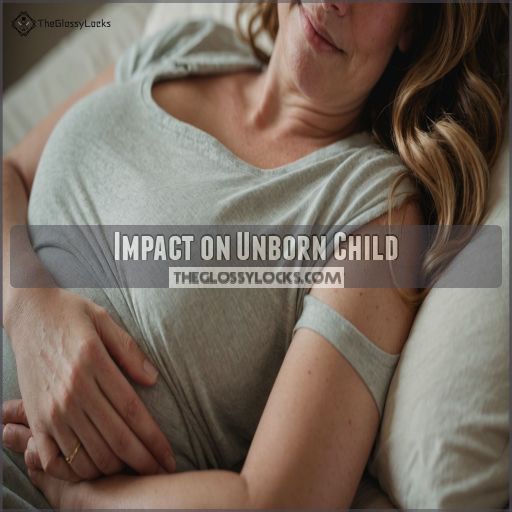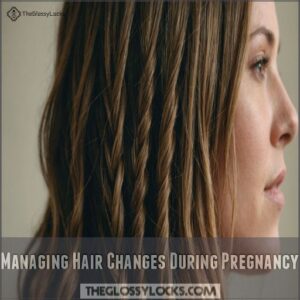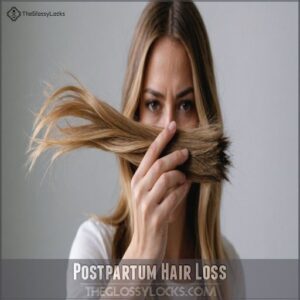This site is supported by our readers. We may earn a commission, at no cost to you, if you purchase through links.
 Yes, hair growth can be a sign of pregnancy due to hormonal changes in your body.
Yes, hair growth can be a sign of pregnancy due to hormonal changes in your body.
During pregnancy, you’ll likely notice your hair becoming thicker and fuller as increased estrogen levels slow down your normal hair shedding cycle.
You might also spot new hair growth in unexpected places like your belly or face – don’t worry, it’s completely normal!
While these changes can indicate pregnancy, they’re not a definitive sign since hormonal fluctuations can have many causes.
Understanding these changes can help you navigate your pregnancy journey, from managing new growth patterns to preparing for postpartum adjustments.
Table Of Contents
- Key Takeaways
- Hormonal Changes and Hair Growth
- Signs of Pregnancy Through Hair Changes
- Can Excessive Hair Growth Indicate Pregnancy?
- Managing Hair Changes During Pregnancy
- Postpartum Hair Loss
- Hair Removal During Pregnancy
- Is Hair Growth a Definite Sign of Pregnancy?
- Frequently Asked Questions (FAQs)
- Can pregnancy cause hair growth?
- What causes increased facial hair in women?
- Are pregnancy hair changes normal?
- What happens to your hair during pregnancy?
- How long does hair grow during pregnancy?
- Is hair loss a sign of pregnancy?
- When does pregnancy hair growth start?
- Does your body hair grow faster when you’re pregnant?
- Is hair getting greasy faster a sign of pregnancy?
- Is thin hair a sign of pregnancy?
- Does abnormal hair growth indicate pregnancy complications?
- When does pregnancy-related hair growth typically start?
- Can hair texture changes signal early pregnancy?
- Does hair growth pattern differ with twins?
- Can hair growth locations predict gender accuracy?
- Conclusion
Key Takeaways
- Your hair may become thicker and fuller during pregnancy due to increased estrogen levels, which slow down hair shedding and promote growth.
- You might notice new hair growth in unexpected places like your face or belly, but these changes aren’t exclusive to pregnancy and can have other causes.
- While hair changes can indicate pregnancy, they are not a definitive sign. You’ll need to consider other symptoms and take a pregnancy test for confirmation.
- After giving birth, you may experience temporary hair loss as your hormone levels readjust. This is normal and typically resolves within six months postpartum.
Hormonal Changes and Hair Growth
You might notice some changes in your hair during pregnancy due to hormonal shifts, particularly increased estrogen levels.
These changes can include thicker hair on your head and increased growth in unexpected areas, such as your face, chest, or abdomen.
Effects of Estrogen on Hair
During pregnancy, estrogen works its magic on your hair.
This hormone extends the growth phase of your hair cycle, leading to some surprising changes.
You might notice:
- Fuller, thicker locks that make you feel like a hair commercial star
- Less shedding, as if your hair’s holding on for dear life
- A newfound shine that rivals the glow on your face
- Potential changes in texture, turning your usual ‘do into a new adventure
Estrogen’s effects can vary, but many women enjoy this temporary boost in hair health.
Increased Hair Growth During Pregnancy
Your body’s hormonal roller coaster during pregnancy can lead to increased hair growth.
Estrogen levels skyrocket, keeping your locks in the growing phase longer.
Around 15 weeks, you might notice thicker, fuller hair.
But don’t get too attached – this lush mane is temporary.
After birth, hormones shift again, and you may experience some hair loss.
It’s all part of the pregnancy hair growth timeline.
Hair Growth in Unusual Areas
Hormonal changes during pregnancy can sprout hair in unexpected places.
You might notice increased hair growth on your face, chest, back, belly, or legs.
This is due to higher estrogen levels keeping hair in the growth phase longer.
Don’t worry, though – it’s a normal part of pregnancy.
Most of this extra hair will fade within six months after giving birth.
Signs of Pregnancy Through Hair Changes
Your hair might be trying to tell you something if you’re expecting.
During pregnancy, hormonal changes can cause noticeable shifts in your hair’s thickness, texture, and even oiliness, potentially offering early clues about your condition.
Thicker and Fuller Hair
Along with the baby bump, pregnancy often brings a surprising perk: luscious locks.
Estrogen levels soar, keeping your hair in the growing phase longer.
You might notice:
- Thicker strands around 15 weeks
- Fuller-looking hair overall
- Less shedding than usual
This hair growth pregnancy phenomenon is temporary, so enjoy your pregnancy glow while it lasts.
Just remember, everyone’s pregnancy hair cycle is unique – some might experience minimal changes, while others rock a full-blown mane makeover.
Greasier Hair
Many women notice their hair becoming greasier during pregnancy.
This change stems from increased hormone levels, particularly estrogen, which can boost sebum production in your scalp.
You might find yourself washing your hair more frequently to combat the extra oil.
Don’t worry, though – this is a common pregnancy symptom.
Adjusting your hair care routine and using oil-absorbing products can help manage the greasiness until your hormones settle down postpartum.
Drier Hair
Pregnancy can turn your luscious locks into a desert landscape.
You might notice your scalp feeling itchy and your hair becoming brittle.
This dryness is often due to hormonal changes affecting your body’s hydration levels.
To combat this, focus on hydration from the inside out.
Drink plenty of water and use moisturizing hair products.
Consider a humidifier to counteract dry air effects on your hair.
Changes in Hair Texture
Your hair’s texture may do a 180 during pregnancy.
Pregnancy hormones can transform your locks, making them feel thicker, coarser, or even curlier.
You might notice your once-straight hair developing waves or your curls becoming tighter.
While experiencing these changes, consider exploring hair growth products designed for pregnancy to support your hair’s journey.
These changes are typically temporary and often revert after childbirth.
Embrace this hair metamorphosis, but remember, everyone’s experience is unique.
Your mane might just surprise you!
Can Excessive Hair Growth Indicate Pregnancy?
You might notice extra hair growth in unusual places during pregnancy, as rising estrogen levels keep your hair in the growing phase longer than usual.
While this increase in body hair is typically harmless, in rare cases it can signal a condition called hyperandrogenism that requires medical attention.
Hyperandrogenism and Excessive Hair Growth
Hair growth around the nipples can be influenced by hormonal fluctuations, such as those caused by hormonal imbalances during pregnancy like those experienced during puberty or menopause. While hair changes during pregnancy are normal, excessive hair growth might signal hyperandrogenism – when your body produces too many male hormones.
Understanding this condition helps you take control of your health.
Excessive hair growth can also be influenced by genetic factors, including inherited conditions like polycystic ovary syndrome, which can increase the risk of hirsutism.
Here’s what to watch for:
- Dark, coarse hair in new places
- Rapid weight gain with muscle development
- Deeper voice changes
- Acne flare-ups
Talk to your doctor about hormone testing if you notice these signs.
Rare Complications of Hyperandrogenism
Beyond typical hair changes, severe hyperandrogenism during pregnancy can trigger serious complications.
You might notice rapid weight gain, muscle mass increases, or vocal changes.
If you’re experiencing these symptoms, managing hyperandrogenism during pregnancy with the right products and care is essential, and resources like Hyperandrogenism pregnancy products can be helpful.
These symptoms often signal underlying hormonal imbalances that need medical attention.
Don’t brush off these changes – they can affect your blood pressure and metabolism.
Regular check-ups help catch and manage these complications early, ensuring you stay healthy.
Impact on Unborn Child
Hormonal changes during pregnancy can affect more than just the mother.
Now let’s consider how these shifts might impact your developing baby.
Research shows that hormonal imbalances, which can be addressed through Ayurvedic hair growth approaches, can contribute to excessive hair growth. Excessive hair growth linked to hyperandrogenism requires careful monitoring, especially for baby girls.
- Higher androgen levels may influence fetal development
- Baby girls might develop male-like characteristics
- Gender development can be affected by hormone imbalances
- Regular doctor visits help manage potential complications
Managing Hair Changes During Pregnancy
You’ll notice significant changes in your hair’s thickness, texture, and oiliness throughout your pregnancy due to fluctuating hormone levels.
Whether you’re dealing with thicker locks or managing excess oil, there are proven strategies you can use to maintain healthy hair during this transformative time.
Tips for Dealing With Thicker Hair
Your pregnancy hair calls for smart styling choices.
Try volumizing products away from your roots and embrace loose, comfortable hairstyles that won’t strain your scalp.
You’ll love how a shoulder-length cut with layers can manage that extra thickness without daily battles.
Switch to a wide-toothed comb for gentle detangling, and skip the heat styling when possible – your thicker locks will thank you.
Strategies for Managing Greasier Hair
Pregnancy can turn those locks into an oil slick, but don’t worry – you’ve got options!
Switch to a clarifying shampoo and wash every other day to maintain balance.
Keep conditioner away from your scalp, focusing only on the ends.
Try dry shampoo between washes to absorb excess oil.
Simple dietary tweaks like reducing fried foods can help manage that extra shine naturally.
Solutions for Dealing With Drier Hair
When dry, brittle strands leave you feeling like a withered plant, deep conditioning treatments become your secret weapon.
Apply nourishing hair masks weekly to restore moisture, and embrace natural hair oils as your new best friend.
Skip daily washing to preserve natural oils, and invest in sulfate-free styling products.
Remember to drink plenty of water – what’s good for your body is great for your hair.
Importance of Proper Hair Care
Maintaining a healthy scalp is like tending a garden – it needs the right care to flourish.
Now that we’ve covered moisture challenges, let’s look at smart hair care strategies that’ll keep those pregnancy-powered locks in check.
Understanding how hormones affect your hair helps you make informed choices about products and styling methods.
- Choose sulfate-free shampoos to protect your scalp’s natural oils
- Style with loose braids or soft scrunchies to prevent breakage
- Incorporate omega-rich foods like salmon and nuts into your diet
Postpartum Hair Loss
You’ve enjoyed luscious locks during pregnancy, but now you’re shedding more than your cat.
Don’t panic – postpartum hair loss is a common occurrence that affects many new mothers due to hormonal changes after childbirth.
Causes of Postpartum Hair Loss
The rollercoaster of postpartum hair loss can leave you feeling frazzled.
Your locks have been on a wild ride, and now they’re taking a tumble.
Let’s break down the main culprits behind this hair-raising experience:
| Cause | Description |
|---|---|
| Hormonal Shifts | Estrogen levels plummet, triggering Telogen Effluvium |
| Stress | Physical and emotional strain can accelerate hair shedding |
| Nutritional Deficiencies | Lack of essential nutrients may weaken hair follicles |
Don’t worry, though.
This shedding situation is usually temporary, and you’ll soon be back to your fabulous, full-haired self.
Treatment Options for Postpartum Hair Loss
Hope isn’t lost regarding postpartum hair loss. You’ve got options to tackle those thinning tresses. Minoxidil, a topical treatment, can jumpstart hair growth.
Supplements packed with biotin and iron might give your locks a boost. For a high-tech approach, try Low-Level Laser Therapy (LLLT).
Don’t forget lifestyle tweaks – a balanced diet and stress management can work wonders. Remember, patience is key; your luscious locks will return in time.
Natural Remedies for Hair Loss
Feeling down about your thinning locks? Don’t fret!
Try giving yourself a scalp massage to boost circulation and stimulate growth.
DHT-blocking shampoos can help, too.
Whip up a fenugreek mask for added fullness, or dab on some amla oil to nourish your strands.
Remember, a diet rich in omega-3s and biotin can work wonders.
These natural remedies might just be the ticket to reclaiming your luscious mane after pregnancy.
Hair Removal During Pregnancy
You’ll be relieved to know that most common hair removal methods are safe during pregnancy.
While shaving, plucking, and waxing are generally okay, it’s best to consult your healthcare provider about professional options like laser treatments or electrolysis.
Safe Hair Removal Methods During Pregnancy
Dealing with hair removal during pregnancy can feel like a minefield.
You’ll be relieved to know that many at-home methods are generally safe.
When shaving, remember to focus on Razor Blade Care to avoid ingrown hairs and razor bumps.
Shaving and plucking remain trusty standbys, while waxing can be a longer-lasting option.
Remember to moisturize afterward to soothe your skin.
However, it’s best to avoid depilatory creams, as their safety during pregnancy isn’t well-studied.
- Smooth legs without the worry
- Embrace your natural glow
- Take control of unwanted hair
- Pamper yourself safely
Professional Hair Removal Options After Pregnancy
After pregnancy, you might consider professional hair removal options to tackle that stubborn pregnancy-related hair growth. Some women turn to natural methods like threading for hair reduction, which can be less painful than waxing and even reduce future hair growth when done correctly.
Those looking for a permanent solution can explore products and services related to electrolysis at a dedicated Electrolysis store.
Let’s explore some effective methods:
| Method | Description | Pros | Cons |
|---|---|---|---|
| Laser hair removal | Uses light to destroy hair follicles | Long-lasting results | Multiple sessions needed |
| Electrolysis | Removes individual hairs with electric current | Permanent solution | Time-consuming |
| Waxing | Removes hair from the root | Quick results | Temporary, can be painful |
| Threading | Uses twisted thread to remove hair | Precise, good for facial hair | Temporary, skill-dependent |
These options offer varying degrees of permanence and effectiveness.
Consult your healthcare provider to determine the best choice for your post-pregnancy needs.
Is Hair Growth a Definite Sign of Pregnancy?
While increased hair growth can occur during pregnancy due to hormonal changes, it’s not a definitive sign on its own.
You’ll need to factor in other pregnancy symptoms and consider how hair products with drying alcohols, such as those containing SD alcohol for hair drying, might affect your hair growth, as various factors like genetics, diet, and health conditions can also influence hair growth.
Other Factors Influencing Hair Growth
While hair changes can hint at pregnancy, they’re not a definitive sign.
Your body’s hair growth is influenced by various factors beyond pregnancy hormones, including hormonal imbalances such as estrogen and thyroid hormones that impact hair growth cycles.
Let’s explore some key players:
- Stress: Using natural remedies like ginger for hair growth may help control stress-related hair issues. It can trigger hair loss or excessive growth
- Nutrition: A balanced diet fuels healthy hair
- Medications: Some can affect your hair’s growth cycle
Age, genetics, and underlying health conditions also play roles in hair growth.
So, before you jump to conclusions, remember that your locks tell a complex story.
Importance of Medical Consultation
Hair growth isn’t a definite sign of pregnancy.
Many factors can affect your hair, so it’s best to consult a doctor for an accurate diagnosis.
They’ll consider your symptoms, run tests, and provide expert advice.
Don’t rely on Dr. Google or old wives’ tales – your health deserves professional attention.
Remember, every pregnancy is unique, and a medical consultation makes sure you’re on the right track for your health and your baby’s.
Frequently Asked Questions (FAQs)
Can pregnancy cause hair growth?
Pregnancy hormones can make your body produce extra hair on your face, belly, and other areas. You’ll notice thicker head hair around 15 weeks, but don’t worry—most changes are temporary.
What causes increased facial hair in women?
Like a garden responding to nature’s signals, your facial hair growth stems from hormonal changes, particularly elevated androgens.
You’ll notice this due to conditions like PCOS, menopause, or medications affecting your hormone balance.
Are pregnancy hair changes normal?
During your pregnancy journey, you’ll notice completely normal hormonal changes affecting your hair – from increased thickness to new growth patterns. These changes typically resolve within six months after delivery.
What happens to your hair during pregnancy?
Your hair will grow thicker and fuller due to increased estrogen levels.
You’ll notice less shedding and possible new growth on your body.
After delivery, you’ll experience temporary hair loss as hormones readjust.
How long does hair grow during pregnancy?
Pregnancy transforms you into a hair-growing powerhouse!
You’ll notice increased thickness around 15 weeks, and it’ll continue growing until delivery.
Don’t worry though – this extra growth typically returns to normal within six months postpartum.
Is hair loss a sign of pregnancy?
Hormonal changes can trigger hair loss in early pregnancy, but it’s not a reliable sign.
You’ll notice increased shedding from stress or thyroid changes, which might affect up to 30% of your hair.
When does pregnancy hair growth start?
Studies show 90% of pregnant women experience noticeable hair changes. You’ll likely notice thicker, fuller hair around week 15 when estrogen keeps follicles in the growth phase longer than usual.
Does your body hair grow faster when you’re pregnant?
Your body hair will grow faster and thicker during pregnancy due to increased estrogen levels. Additionally, during this time, many women also use hairstyles like braids for hair growth. Your body hair will grow faster and thicker during pregnancy due to increased estrogen levels.
You’ll notice changes around 15 weeks, particularly on your belly, face, and arms.
Don’t worry—it’s temporary!
Is hair getting greasy faster a sign of pregnancy?
Increased oil production in your scalp can indicate pregnancy due to rising hormone levels.
You’ll notice greasier hair than usual, often appearing within weeks of conception.
Consider taking a pregnancy test for confirmation.
Is thin hair a sign of pregnancy?
Despite worries about hair changes, thin hair isn’t typically a pregnancy sign.
While hormones can affect hair later in pregnancy, you’ll want to check with your doctor if you’re experiencing unusual hair loss.
Does abnormal hair growth indicate pregnancy complications?
Abnormal hair growth during pregnancy is usually harmless, but in rare cases, it can signal complications.
Excessive hair on your face or body might indicate hyperandrogenism, a condition affecting hormone levels.
If you’re concerned, consult your doctor for proper evaluation.
When does pregnancy-related hair growth typically start?
Your lovely locks might start their pregnancy growth spurt around 15 weeks.
You’ll notice hair getting thicker and possibly appearing in new places.
This hormonal change is perfectly normal, so embrace your luscious tresses while they last!
Can hair texture changes signal early pregnancy?
Hair texture changes can indeed signal early pregnancy.
You might notice your locks feeling thicker or oilier due to hormonal shifts.
While not a definitive sign, these changes often occur alongside other early pregnancy symptoms.
Does hair growth pattern differ with twins?
Like a game of double or nothing, twin pregnancies don’t necessarily mean double the hair growth.
While hormonal changes affect all pregnancies, there’s no scientific evidence suggesting a distinct hair growth pattern for twin pregnancies compared to single pregnancies.
Can hair growth locations predict gender accuracy?
Despite popular myths, science doesn’t support the idea that hair growth locations can predict a baby’s gender.
Hormonal changes during pregnancy affect hair growth differently for each woman, regardless of the baby’s sex.
It’s just an old wives’ tale.
Conclusion
Who knew your luscious locks could be a pregnancy predictor?
While hair growth can indeed be a sign of pregnancy, it’s not a definitive test.
Hormonal changes during pregnancy can lead to thicker, fuller hair and even new growth in unexpected places.
However, these changes can also be caused by other factors.
If you’re wondering "can hair growth be a sign of pregnancy," remember it’s just one potential clue.
For a definitive answer, consult your healthcare provider and take a pregnancy test.















